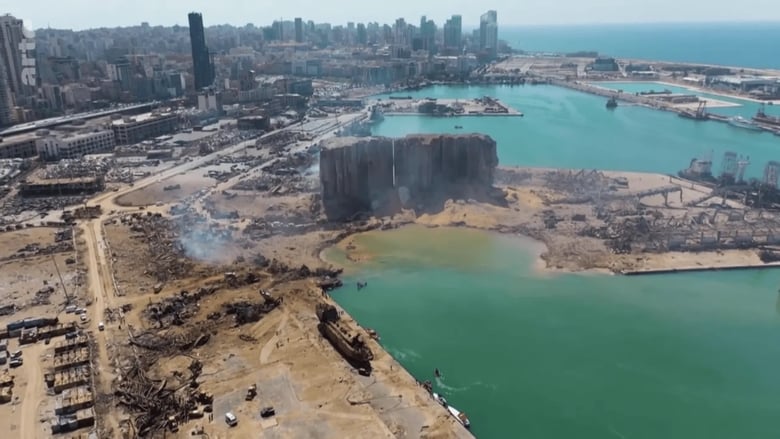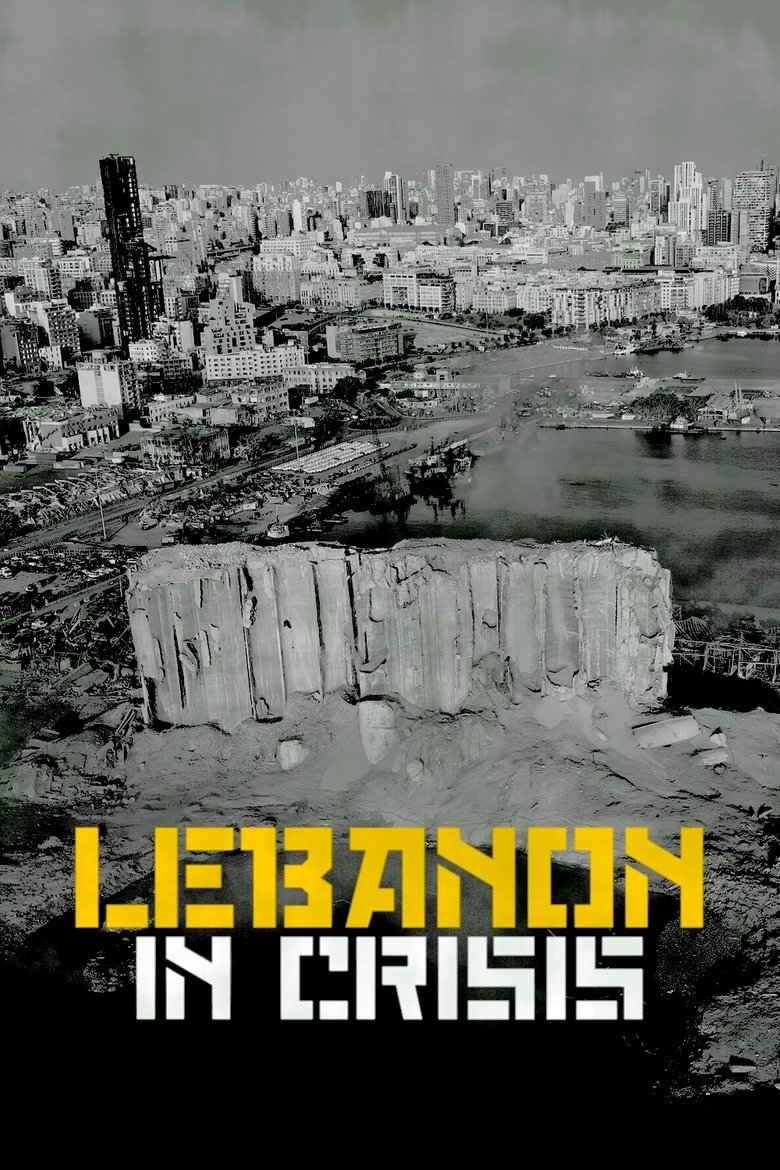Loading


Lebanon in Crisis
Genres
DocumentaryHistory
Overview
The apocalyptic blast in the Port of Beirut, Lebanon, on August 4, 2020, exacerbates anger at those in power: protests cross religious boundaries as the Lebanese people curse corruption, nepotism, gross economic mismanagement and squandering of resources. How did the Land of Cedars, a country with so much to offer, allow itself to get into such a dire situation? And will it be able to bounce back?
Details
Budget
$0
Revenue
$0
Runtime
53 min
Release Date
2020-11-17
Status
Released
Original Language
French
Vote Count
3
Vote Average
5.7
Cast
Meet the talented actors who bring the movie to life.
Hiba Dandachli
Self - Social Media Activist
Chawki Azoury
Self - Psychiatrist
Albert Kostanian
Self - Political Journalist
Bertrand Badie
Self - Political Scientist
Gisèle Khoury
Self - Journalist
Agnès Levallois
Self - Middle East Expert
Michael Young
Self - Political Analyst
Lamia Moubayed-Bissat
Self - UN Member
Amin Maalouf
Self - Writer
Stéphane Malsagne
Self - Historian
Walid Charara
Self - Pro-Hezbollah Journalist
Saad Hariri
Self - Politician (archive footage)
Yasser Arafat
Self - Politician (archive footage)
Hafez al-Assad
Self - Politician (archive footage)
Hassan Nasrallah
Self - Hezbollah Leader (archive footage)
Bashar Hafez al-Assad
Self - Politician (archive footage)
Rafic Hariri
Self - Politician (archive footage)
Jacques Chirac
Self - Politician (archive footage)
Similar Movies
Explore movies similar to this one that you might also enjoy.
7.1
Munich
During the 1972 Olympic Games in Munich, eleven Israeli athletes are taken hostage and murdered by a Palestinian terrorist group known as Black September. In retaliation, the Israeli government recruits a group of Mossad agents to track down and execute those responsible for the attack.
2005-12-23 | en
5.0
A Letter from Beirut
Letter from Beirut documents the filmmaker's return to Beirut during one of the lulls, three years after the outbreak of the civil war, animated by the urge to return. She is confronted by the physical, emotional and psychological ravages of the war, terrified and sorrowful, she cannot find her place in the city. In that quest, she communicates with everyday people, friends, neighbors, people riding the bus across the city's eastern and western flanks. To pace her journeying and dramatic unraveling of the film, Saab borrows the guise of a letter read in a voice-over, written by world-renowned poet Etel Adnan. A rare document from the civil war, Letter from Beirut lays bare and spontaneously how people make sense of their everyday in the midst of chaos, violence, terror and sorrow.
1978-01-01 | fr
7.9
Ben-Hur
In 26 AD, Judah Ben-Hur, a Jew in ancient Judea, opposes the occupying Roman empire. Falsely accused by a Roman childhood friend-turned-overlord of trying to kill the Roman governor, he is put into slavery and his mother and sister are taken away as prisoners.
1959-11-18 | en
0.0
The Drift
The Drift traces the shifting economies of objects in contemporary Lebanon. The film moves between three main characters: the gatekeeper of the Roman temples of Niha in the Beqaa Valley; a young mechanic from Britel, a village known for trading automobile parts; and an archaeological conservator working at the American University of Beirut.
2017-03-31 | en
7.0
An Oppressed People Is Always Right
In May 1974, the Israeli Air Force carried out an extermination operation against the Palestinian refugee camp Nabatiyeh. With this as a starting point, it is reviewed how the last 50 years of Zionist colonization of Palestine have partly led to the establishment of the state of Israel, partly to the expulsion of a people, the Palestinians, from their land. The film shows scenes of daily life in Palestinian refugee camps. We hear various of the inhabitants talk about their desire to return to their country, and we follow how the resistance movement works to free women from their traditional backward role. At the same time, the emergence of the armed resistance struggle is analysed, and the significance of the latest military technological developments for guerilla wars in the 3rd world is explained.
1976-05-31 | da
7.2
Introduction to the End of an Argument
This highly kinetic tableaux of uprooted sights and sounds works most earnestly to expose the racial biases concealed in familiar images. Relying on valuable snippets from feature films such as "Exodus", "Lawrence of Arabia", "Black Sunday", "Little Drummer Girl", and network news shows, the filmmakers have constructed an oddly wry narrative, mimicking the history of Mid East politics.
1990-01-01 | ar
5.2
It's All in Lebanon
Wissam Charaf traces the recent history and identity of Lebanon through its political campaigns, PR imagery and pop videos.
2012-05-31 | ar
5.7
I Want to See
July 2006. Another war breaks out in Lebanon. The directors decide to follow a movie star, Catherine Deneuve and a friend, actor and artist Rabih Mroue;, on the roads of South Lebanon. Together, they will drive through the regions devastated by the conflict. It is the beginning of an unpredictable, unexpected adventure...
2008-05-16 | fr
7.7
Waltz with Bashir
An Israeli film director interviews fellow veterans of the 1982 invasion of Lebanon to reconstruct his own memories of his term of service in that conflict.
2008-06-12 | he
10.0
Bil'in Habibti
The Israeli filmmaker Shai Corneli Polak records the building of the 'security wall' through Palestinian territory at the village of Bil'in. The villagers protest mostly peacefully, while the Israeli army doesn't react peacefully. By now the Israeli High Court has ruled that the building of the wall was illegal.
2006-01-01 | en
0.0
The Woman Pastor
In a community of a Muslim majority, the first woman pastor in the Middle East leads a parish in one of the poorest city of the Mediterranean, in the heart of Tripoli, North Lebanon.
2023-08-19 | en
7.2
The Message
In sixth-century Mecca, Prophet Muhammad receives his first revelation from God as a messenger. Three years later, he's not alone in his quest and publicly declares his prophecy. Muhammad is fought by Abu Sufian and his wife Hind, rulers of Mecca. Muhammad's followers are hunted and tortured but he continues his calling.
1976-03-09 | en
10.0
Le Tibet face à la Chine, le dernier souffle ?
As the crucial question arises of the future succession of the Dalai Lama, we take a look back at the tormented history of the "Land of Snows" which lives under Chinese domination and which remains a geopolitical issue of the first order. A valuable documentary that gives voice to a people that China is trying to permanently silence.
2024-02-27 | fr
7.6
Beyond Utopia
A courageous pastor uses his underground network to rescue and aid North Korean families as they risk their lives to embrace freedom.
2023-10-23 | en
0.0
Minerva
Severely battered from the Beirut Port Explosion on August 4th, Minerva passed away eight days later. Her son Joseph, while still grieving for his loss, sunk into a long and absurd bureaucratic path through the inept system that disowned his mother as a victim of the blast. Minerva is gone. The explosion has snatched her soul, and the city walls have not yet recognized her as a martyr. There is no poster of her smiling face among those of the victims. Their faces are memories that will haunt us for the rest of our lives. Perhaps her son, devastated by her passing, seeks to etch her image into the city's memory. Perhaps he is seeking some confession to the crime. This is a place that casts out its children, whether dead or alive.
2021-06-01 | ar
0.0
Isis: The Origins of Violence
Historian Tom Holland traces the origins of Isis’ barbaric and sadistic violence which it claims is justified by the tenets and scriptures of Islam.
2017-05-17 | en
0.0
Face à la mer
Raymond Depardon had photographed the city of Beirut before it was destroyed and rebuilt. He films a long take of his photographs, like a circular panorama, producing a videoclip for the song "Face à la mer" by french rock band Les Negresses Vertes.
1993-01-01 | fr
2.0
Chosen and Excluded - Jew Hatred in Europe
2017-06-13 | de
6.6
Under the Bombs
In the wake of Israel's 2006 bombardment of Lebanon, a determined woman finds her way into the country convincing a taxi driver to take a risky journey around the scarred region in search of her sister and her son.
2007-09-02 | fr
5.8
Eldorado
Drawing inspiration from his personal encounter with the Italian refugee child Giovanna during World War II, Markus Imhoof tells how refugees and migrants are treated today: on the Mediterranean Sea, in Lebanon, in Italy, in Germany and in Switzerland.
2018-04-26 | de